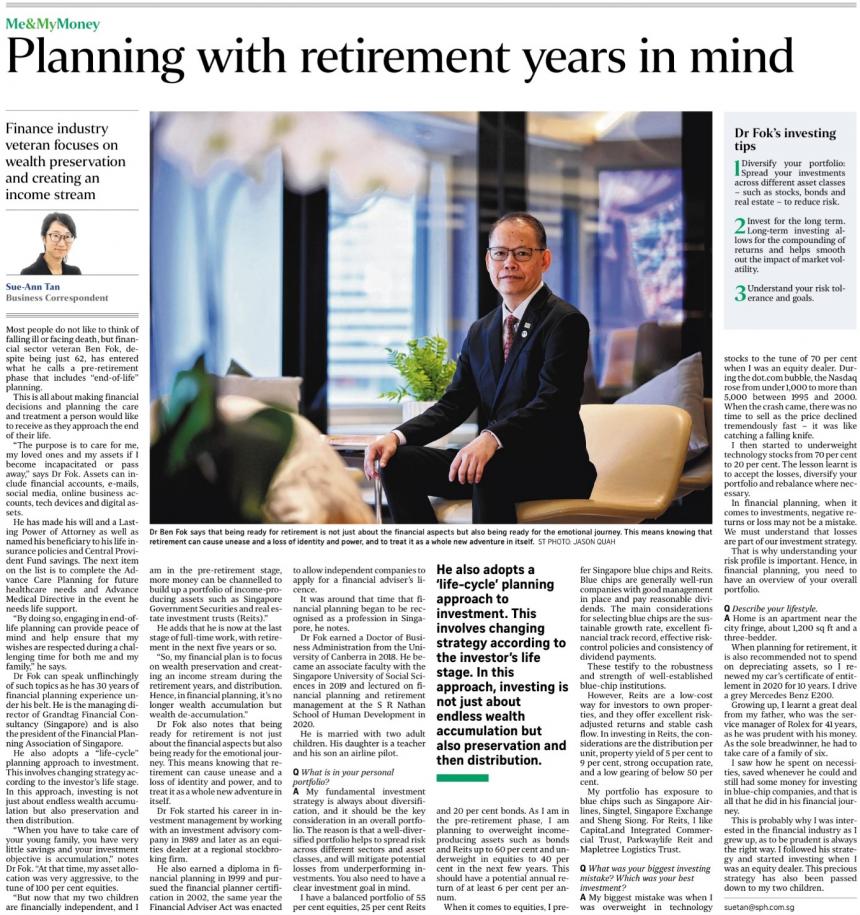You are here
Back to top
新聞稿
An exclusive interview with Dr. Ben Fok by the Straits Times “Planning with retirement years in mind” (English Only)

[Singapore, January 2024] An exclusive interview with Grandtag Financial Consultancy's (GFC) Managing Director – Dr. Ben Fok sharing how a finance industry veteran prepares for retirement and adopts a “life-cycle” planning approach to investment for wealth preservation and creating an income stream:
Most people do not like to think of falling ill or facing death, but financial sector veteran Ben Fok, despite being just 62, has entered what he calls a pre-retirement phase that includes “end-of-life” planning.
This is all about making financial decisions and planning the care and treatment a person would like to receive as they approach the end of their life.
“The purpose is to care for me, my loved ones and my assets if I become incapacitated or pass away,” says Dr Fok. Assets can include financial accounts, e-mails, social media, online business accounts, tech devices and digital assets.
He has made his will and a Lasting Power of Attorney as well as named his beneficiary to his life insurance policies and Central Provident Fund savings. The next item on the list is to complete the Advance Care Planning for future healthcare needs and Advance Medical Directive in the event he needs life support.
“By doing so, engaging in end-of-life planning can provide peace of mind and help ensure that my wishes are respected during a challenging time for both me and my family,” he says.
Dr Fok can speak unflinchingly of such topics as he has 30 years of financial planning experience under his belt. He is the managing director of Grandtag Financial Consultancy (Singapore) and is also the president of the Financial Planning Association of Singapore.
He also adopts a “life-cycle” planning approach to investment. This involves changing strategy according to the investor’s life stage. In this approach, investing is not just about endless wealth accumulation but also preservation and then distribution.
“When you have to take care of your young family, you have very little savings and your investment objective is accumulation,” notes Dr Fok. “At that time, my asset allocation was very aggressive, to the tune of 100 per cent equities.
“But now that my two children are financially independent, and I am in the pre-retirement stage, more money can be channelled to build up a portfolio of income-producing assets such as Singapore Government Securities and real estate investment trusts (Reits).”
He adds that he is now at the last stage of full-time work, with retirement in the next five years or so.
“So, my financial plan is to focus on wealth preservation and creating an income stream during the retirement years, and distribution. Hence, in financial planning, it’s no longer wealth accumulation but wealth de-accumulation.”
Dr Fok also notes that being ready for retirement is not just about the financial aspects but also being ready for the emotional journey. This means knowing that retirement can cause unease and a loss of identity and power, and to treat it as a whole new adventure in itself.
Dr Fok started his career in investment management by working with an investment advisory company in 1989 and later as an equities dealer at a regional stockbroking firm.
He also earned a diploma in financial planning in 1999 and pursued the financial planner certification in 2002, the same year the Financial Adviser Act was enacted to allow independent companies to apply for a financial adviser’s licence.
It was around that time that financial planning began to be recognised as a profession in Singapore, he notes.
Dr Fok earned a Doctor of Business Administration from the University of Canberra in 2018. He became an associate faculty with the Singapore University of Social Sciences in 2019 and lectured on financial planning and retirement management at the S R Nathan School of Human Development in 2020.
He is married with two adult children. His daughter is a teacher and his son an airline pilot.
He also adopts a 'life-cycle' planning approach to investment. This involves changing strategy according to the investor's life stage. In this approach, investing is not just about endless wealth accumulation but also preservation and then distribution.
Q: What is in your personal portfolio?
A: My fundamental investment strategy is always about diversification, and it should be the key consideration in an overall portfolio. The reason is that a well-diversified portfolio helps to spread risk across different sectors and asset classes, and will mitigate potential losses from underperforming investments. You also need to have a clear investment goal in mind.
I have a balanced portfolio of 55 per cent equities, 25 per cent Reits and 20 per cent bonds. As I am in the pre-retirement phase, I am planning to overweight income-producing assets such as bonds and Reits up to 60 per cent and underweight in equities to 40 per cent in the next few years. This should have a potential annual return of at least 6 per cent per annum.
When it comes to equities, I prefer Singapore blue chips and Reits. Blue chips are generally well-run companies with good management in place and pay reasonable dividends. The main considerations for selecting blue chips are the sustainable growth rate, excellent financial track record, effective risk-control policies and consistency of dividend payments.
These testify to the robustness and strength of well-established blue-chip institutions.
However, Reits are a low-cost way for investors to own properties, and they offer excellent risk-adjusted returns and stable cash flow. In investing in Reits, the considerations are the distribution per unit, property yield of 5 per cent to 9 per cent, strong occupation rate, and a low gearing of below 50 per cent.
My portfolio has exposure to blue chips such as Singapore Airlines, Singtel, Singapore Exchange and Sheng Siong. For Reits, I like CapitaLand Integrated Commercial Trust, Parkwaylife Reit and Mapletree Logistics Trust.
Q: What was your biggest investing mistake? Which was your best investment?
A: My biggest mistake was when I was overweight in technology stocks to the tune of 70 per cent when I was an equity dealer. During the dot.com bubble, the Nasdaq rose from under 1,000 to more than 5,000 between 1995 and 2000. When the crash came, there was no time to sell as the price declined tremendously fast – it was like catching a falling knife.
I then started to underweight technology stocks from 70 per cent to 20 per cent. The lesson learnt is to accept the losses, diversify your portfolio and rebalance where necessary.
In financial planning, when it comes to investments, negative returns or loss may not be a mistake. We must understand that losses are part of our investment strategy.
That is why understanding your risk profile is important. Hence, in financial planning, you need to have an overview of your overall portfolio.
Q: Describe your lifestyle.
A: Home is an apartment near the city fringe, about 1,200 sq ft and a three-bedder.
When planning for retirement, it is also recommended not to spend on depreciating assets, so I renewed my car’s certificate of entitlement in 2020 for 10 years. I drive a grey Mercedes Benz E200.
Growing up, I learnt a great deal from my father, who was the service manager of Rolex for 41 years, as he was prudent with his money. As the sole breadwinner, he had to take care of a family of six.
I saw how he spent on necessities, saved whenever he could and still had some money for investing in blue-chip companies, and that is all that he did in his financial journey.
This is probably why I was interested in the financial industry as I grew up, as to be prudent is always the right way. I followed his strategy and started investing when I was an equity dealer. This precious strategy has also been passed down to my two children.
Dr Fok’s top investing tips:
- Diversify your portfolio: Spread your investments across different asset classes, such as stocks, bonds and real estate, to reduce risk.
- Invest for the long term. Long-term investing allows for the compounding of returns and helps smooth out the impact of market volatility.
- Understand your risk tolerance and goals.
Read the full article: https://www.straitstimes.com/business/invest/me-my-money-planning-with-retirement-years-in-mind

